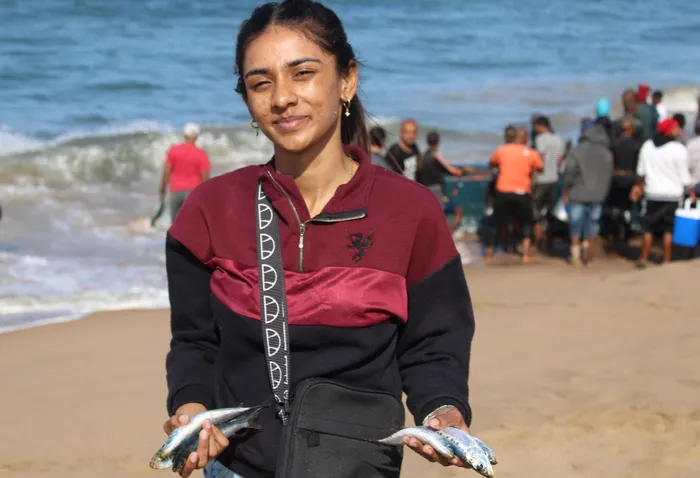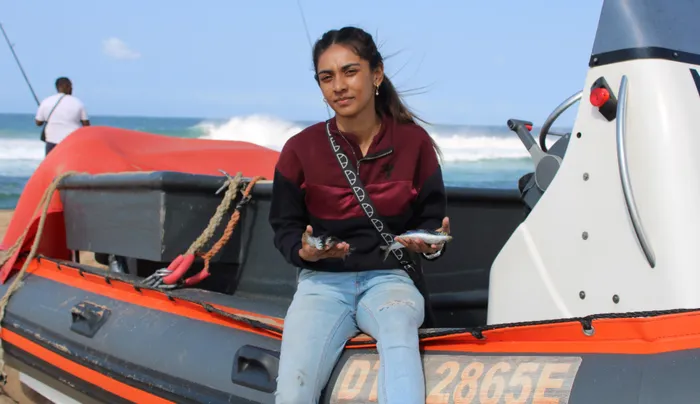Honouring a legacy: Fathima Fareed's quest to become a seine netter
On a mission

Fathima Fareed at this year's sardine run
Image: Yoshini Perumal
AT JUST 20, Fathima Fareed is on a mission to become South Africa's first female seine netter, honouring her grandfather's legacy while inspiring young women to break into the fishing industry.
From the time she was two years old, Fareed, of Moorton in Chatsworth, was inspired by her grandfather, Goolam Fareed Essack, a seine netter and subsistence fisherman who died tragically during last year’s sardine run.
Essack, 73, of Welbedacht, a seasoned skipper, died after his boat capsized while he was netting sardines, at Umgababa Beach, on the south coast.
He and three other staff were about 100 meters away from the shoreline when the boat engine cut off. At the time Essack was running the net around the shoal. A wave crashed onto the boat, capsizing it.
Fareed told the POST that her real love for netting started when she was just 10-years-old.
It was a dream come true for Fareed when her grandfather allowed her to be one of his three passengers on his four-man boat.
“I was 10 when my grandfather took me on his boat to net sardines for the first time. I had to put on a lifejacket. My grandpa told me to stand by him and not move unless he tells me to. He felt I was ready at that age to learn how to net during the sardine run. My dad was on the shore. There were two others on the boat. They were divers.
“It felt amazing, exhilarating, overwhelming, and exciting all at once. The experience was surreal,” she said.
This moment made Fareed realise that she wanted to be the country’s first female seine netter.
“I also have fond memories of when I was two-years-old and accompanied my father Faizel and grandfather to the beach. I played on the shore while they fished and netted. My earliest memories are of them loading the sardines into crates.
“I would stand in the back of the van and scream ‘sardines’ to get the attention of customers. My grandfather also indulged us by making a fire and frying the sardines on the beach. We ate it with buttered bread,” said Fareed.
“I was always curious about netting and fishing. My best memory with my grandpa on the boat was when he would say 'Baby, see the fish. Grab it with your hands'. I would lean over the boat and grab the fish with my hands. I learnt how to fish with a rod by the time I was five years old,” she added.
Fareed said as the years rolled on she wanted to learn more and more.
“I learnt how to control the boat, drop the net, and sew the net when it got damaged. My grandpa taught me everything. I was not afraid. I loved being at sea. He was my role-model. I then wanted to learn how to skipper. Jayce Govender, my dad’s cousin who is a seasoned skipper and seine netter, joined his crew with my grandpa’s a few years ago. He has been teaching me how to skipper in strong currents and climates. He also taught me how to swim in the ocean,” Fareed added.
She said while her two sisters would feel dirty touching the fish, she loved fishing and netting and would continue the legacy of her father and grandfather.
“My dad is also a subsistence fisherman. Even though I want to continue their legacy by fishing and netting, I am studying plumbing and will pursue that as a career. Seine netting will be my hobby.
“Presently, I am juggling studying and going out for the sardine run. I am at the beach all day and at night, I study. I wake up at 4am and my dad and I are on the road by 5am. It is too early to eat, so we pack some food from home, we fuel up and drive down the coastline checking each beach.
“My dad has an exceptional skill of spotting the fish with a naked eye, no matter what the sea conditions are. Once the fish are spotted, we call for the boat and they go out to sea. When the boat is a good distance from the sardines, we drop the net.
“My grandpa was also great at spotting the fish. I am slowly learning how to spot the shoals. I miss being out at sea,” she added.
Fareed said since Essack passed on, she had not been on a boat.

Fathima Fareed on her grandfather Goolam Fareed Essack's boat
Image: Yoshini Perumal
“The last time I went out to sea was in 2023 with my grandpa. Last year, I did not go at the start at the sardine run because my grandpa said the sea was too rough and he would take me when the conditions were better.
“But on the fourth day of the run, his boat capsized and he died. We were at the beach at the time and I was devastated. It is scary when the waves are huge and the people you love are out there. What happened last year with my grandpa was my biggest fear. Me not being there with him to help him makes me sad. But I have come to realise that he died doing something he loved, so he was happy in the way he died. Therefore I feel I need to be happy that he is resting in peace,” she said.
Fareed hopes that more young girls and women become interested in fishing and seine netting.
“I try to encourage girls and women to fish, but I think the smell puts them off. Some girls think it's a guy's job, so we should leave it to them.
“But it feels good doing something that is not usually done by a woman. It is also exciting being a girl - doing something great - in a boys world. Despite this good feeling, there is still a stigma. People look at you differently because you love something a man was only supposed to love. It hurts when people judge me and pass remarks without knowing how my love for this started.
“My mom, Ramona Fareed, has been very supportive and she always joins me on the beach. I am grateful to my family for allowing me to pursue my passion for fishing and netting," she added.
Fareed said she hoped to get back onto the boat soon to realise her seine netting dream.
Related Topics: